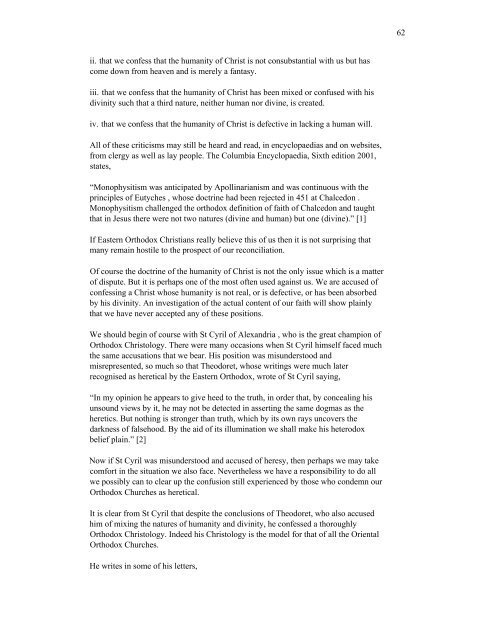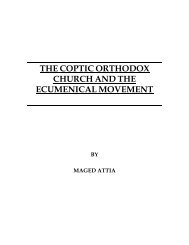Coptic interpretations of the Fourth Ecumenical Council - Saint Mina ...
Coptic interpretations of the Fourth Ecumenical Council - Saint Mina ...
Coptic interpretations of the Fourth Ecumenical Council - Saint Mina ...
You also want an ePaper? Increase the reach of your titles
YUMPU automatically turns print PDFs into web optimized ePapers that Google loves.
ii. that we confess that <strong>the</strong> humanity <strong>of</strong> Christ is not consubstantial with us but has<br />
come down from heaven and is merely a fantasy.<br />
iii. that we confess that <strong>the</strong> humanity <strong>of</strong> Christ has been mixed or confused with his<br />
divinity such that a third nature, nei<strong>the</strong>r human nor divine, is created.<br />
iv. that we confess that <strong>the</strong> humanity <strong>of</strong> Christ is defective in lacking a human will.<br />
All <strong>of</strong> <strong>the</strong>se criticisms may still be heard and read, in encyclopaedias and on websites,<br />
from clergy as well as lay people. The Columbia Encyclopaedia, Sixth edition 2001,<br />
states,<br />
“Monophysitism was anticipated by Apollinarianism and was continuous with <strong>the</strong><br />
principles <strong>of</strong> Eutyches , whose doctrine had been rejected in 451 at Chalcedon .<br />
Monophysitism challenged <strong>the</strong> orthodox definition <strong>of</strong> faith <strong>of</strong> Chalcedon and taught<br />
that in Jesus <strong>the</strong>re were not two natures (divine and human) but one (divine).” [1]<br />
If Eastern Orthodox Christians really believe this <strong>of</strong> us <strong>the</strong>n it is not surprising that<br />
many remain hostile to <strong>the</strong> prospect <strong>of</strong> our reconciliation.<br />
Of course <strong>the</strong> doctrine <strong>of</strong> <strong>the</strong> humanity <strong>of</strong> Christ is not <strong>the</strong> only issue which is a matter<br />
<strong>of</strong> dispute. But it is perhaps one <strong>of</strong> <strong>the</strong> most <strong>of</strong>ten used against us. We are accused <strong>of</strong><br />
confessing a Christ whose humanity is not real, or is defective, or has been absorbed<br />
by his divinity. An investigation <strong>of</strong> <strong>the</strong> actual content <strong>of</strong> our faith will show plainly<br />
that we have never accepted any <strong>of</strong> <strong>the</strong>se positions.<br />
We should begin <strong>of</strong> course with St Cyril <strong>of</strong> Alexandria , who is <strong>the</strong> great champion <strong>of</strong><br />
Orthodox Christology. There were many occasions when St Cyril himself faced much<br />
<strong>the</strong> same accusations that we bear. His position was misunderstood and<br />
misrepresented, so much so that Theodoret, whose writings were much later<br />
recognised as heretical by <strong>the</strong> Eastern Orthodox, wrote <strong>of</strong> St Cyril saying,<br />
“In my opinion he appears to give heed to <strong>the</strong> truth, in order that, by concealing his<br />
unsound views by it, he may not be detected in asserting <strong>the</strong> same dogmas as <strong>the</strong><br />
heretics. But nothing is stronger than truth, which by its own rays uncovers <strong>the</strong><br />
darkness <strong>of</strong> falsehood. By <strong>the</strong> aid <strong>of</strong> its illumination we shall make his heterodox<br />
belief plain.” [2]<br />
Now if St Cyril was misunderstood and accused <strong>of</strong> heresy, <strong>the</strong>n perhaps we may take<br />
comfort in <strong>the</strong> situation we also face. Never<strong>the</strong>less we have a responsibility to do all<br />
we possibly can to clear up <strong>the</strong> confusion still experienced by those who condemn our<br />
Orthodox Churches as heretical.<br />
It is clear from St Cyril that despite <strong>the</strong> conclusions <strong>of</strong> Theodoret, who also accused<br />
him <strong>of</strong> mixing <strong>the</strong> natures <strong>of</strong> humanity and divinity, he confessed a thoroughly<br />
Orthodox Christology. Indeed his Christology is <strong>the</strong> model for that <strong>of</strong> all <strong>the</strong> Oriental<br />
Orthodox Churches.<br />
He writes in some <strong>of</strong> his letters,<br />
62








